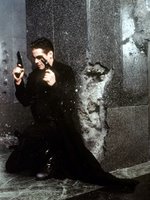What about the Matrix trilogy that pulls in the crowds worldwide?
Mega-heartthrob Keanu Reeves in shades, flying like Superman?
Was it the artfully-choreographed butt-kicking, bullet-dodging action?
Or, jaw-dropping Monica Bellucci dressed in latex outfits?
Maybe, it’s all of the above. But there are also some not-so-veiled philosophical themes behind the movies.
Unfortunately I can’t tell you what the Matrix is. You have to see it for yourself.
Although the Matrix is no evangelistic tract, here are some of my favorite Matrix themes that seem to be played out rather prominently. (Theists, atheists, postmodernists, Buddhists and Hindus would easily find resonance in some of its themes. Even Osama bin Laden could draw inspiration from the liberation fighters of Zion.)
“There Is No Spoon”
 What is the Matrix? It’s a programmed, virtual-reality construct designed to keep human beings docile while their bodies were confined in “battery cells” that fed the Machines with energy. Depending on your worldview, the Matrix could easily be interpreted as naturalism (the idea that life is nothing beyond the molecules and brain signals) or religion as the opium of the masses (Marx) or the illusory samsara etc.
What is the Matrix? It’s a programmed, virtual-reality construct designed to keep human beings docile while their bodies were confined in “battery cells” that fed the Machines with energy. Depending on your worldview, the Matrix could easily be interpreted as naturalism (the idea that life is nothing beyond the molecules and brain signals) or religion as the opium of the masses (Marx) or the illusory samsara etc.These poor souls have the sensory experience that they eat, work, play and fall in love but in reality, they are enslaved and deceived. How this dark scenario came about was documented in the Animatrix’s ‘spoof’ on biblical creation story.
“In the beginning was Man… And Man created the Machines…” Basically the machines gained artificial intelligence and rebelled against their human masters. Man lost the war and in a desperate attempt, triggered a nuclear holocaust that scorched the skies. Their hope that the machines, deprived of solar power, would shut down was in vain. The Machines found a more grisly source of energy in their former masters’ body heat.
What a grim scenario! It’s only a step away from asking the uncomfortable question:
How do I know what I know is real is real?
Morpheus , the John-the-Baptist-like character, defined reality as “what you can feel, what you can smell, what you can taste and see”? Morpheus is name for the Greek god of sleep and dreams.
Is the Real “simply electrical signals interpreted by your brain?” If perception is reality, does a falling tree in the jungle make a sound if nobody is around to hear it? (Philosopher Berkeley would say, “Yes, God is there to perceive it so it’s real”.)
But who would ever deny that the sun rises in the east and sets in the west unless a pesky astronomer called Copernicus told us that it is the earth that revolves around the sun?
Philosophers like Plato and Descartes realized long ago that we could easily be deceived by our sensory perceptions. Descartes began his quest for certainty by doubting everything that can be doubted. Then he realized in order to doubt, he must be a thinking being that exists . This gave rise to the famous air-conditioner ad: “I think therefore I am”.
R.C. Sproul wrote, “Descartes knows he is doubting, because he cannot doubt that he is doubting without establishing doubt. To doubt doubt is to doubt.” (The Consequences of Ideas)
It was the realization that there is no spoon in the illusory Matrix which enabled Neo to perform superhuman feats. The hacker in him could bend its program rules and create his own ‘reality’. Interestingly, it was an insight from the Theravada Buddhist boy-monk.
Looking at it more positively, The Matrix reminds us that life is more than what we can see or touch or feel.









No comments:
Post a Comment